For a normal, healthy person dealing only with minor illnesses—including diseases like measles and chicken pox, which were no big deal for most people—in many ways it was better to be living 50 years ago than now.
(An exception would be for normal childbirth, which had been taken over by hospitals and doctors. Mothers reclaimed their [ahem] birthright in the late 1970s, only to lose it again, and then to partially regain it—it’s the only branch of medicine that I know to be so cyclical.)
I remember doctors making house calls, and doctors who treating the whole family as a unit, which I believe is healthier for all. They trusted parents to describe symptoms accurately and as often as not the doctors gave advice over the telephone and saved many a trip—even when they were no longer making house calls. They still had time to talk with their patients; none of this in-and-out-in-15-minutes assembly line stuff.
However—and it’s a big caveat—for serious illnesses and for emergency medicine, now is a much better time to need medical care. When I was born, polio was still devastating the country and organ transplants were unheard of. CAT scans didn’t appear until twenty years later. From babies to bones, from tumors to head trauma—I hope never to need it, but if I do, I’ll take today’s medical technology with gratitude.
It’s just a pity we can’t have the house calls, too.
When I give thanks for modern dentistry, I’m not referring to the practice of some dentists, which is to do any dental work that might involve pain using some form of anesthesia. It is good for children to learn how to handle pain in small doses. Life is not pain-free, and the habit of seeking medication for every ill is a dangerous one. Personally, I’d much rather deal with the temporary, minor pain of the dentist’s drill than the risk and after-effects of anesthesia. Moreover, when the patient is aware of where the dentist is probing, the dentist is more likely to notice if he’s gone too far or found a trouble spot.
That said, the improvements in dentistry since I was a child have been vast. The drills back then were slow, and much more painful. (Porter’s dentist even used a foot pedal powered drill for a while!) Today’s high-speed drills are almost a pleasure (I said almost) in comparison.
Thanks to fluoride (however controversial it is when put in public water supplies), to dental sealants, and to better attention given to tooth and gum care, even before a baby gets its first tooth, children have many fewer cavities today. Orthodontia has made badly crooked teeth a thing of the past. Onlays, crowns, bridges, and dental implants have greatly extended the life of our natural teeth and delayed the need for dentures.
The need to repair dental caries is so low these days that dentists have taken to whitening teeth to stay in business. What they’ll do if we ever kick our tremendous sugar habit, I don’t know.
 Into the Silent Land: A Guide to the Christian Practice of Contemplation , by Martin Laird (Oxford University Press, 2006)
Into the Silent Land: A Guide to the Christian Practice of Contemplation , by Martin Laird (Oxford University Press, 2006)
The physical benefits of meditative techniques are well established, and I’d like to be able to take advantage of them. What has hindered me is that many—though not all—of the studies have focused on Transcendental Meditation (TM), the Eastern religious aspects of which have led me to keep meditation in general at arm’s length since I first learned of it some 40 years ago. It will not do to gain a physical benefit at a spiritual loss—I can’t help thinking of The Magician’s Nephew, in which Digory was tempted to steal an apple that would have cured his dying mother, but if he had done so, both he and his mother would have later “looked back and said it would have been better to die in that illness.”
Yet Digory, having passed the test, was eventually given another apple, one that healed his mother in the right way. (More)
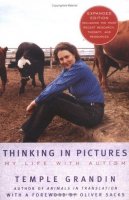 Thinking in Pictures: And Other Reports from My Life with Autism, by Temple Grandin (Vintage, 2006) (Expanded from the original 1995 version)
Thinking in Pictures: And Other Reports from My Life with Autism, by Temple Grandin (Vintage, 2006) (Expanded from the original 1995 version)
I’ve already written about Temple Grandin, the movie, which was the inspiration for getting this book from the library. It’s well worth reading, and the only reason I’m sending back unread the two other books of hers I picked up at the same time is that I realized I must put the brakes on my reading for a while. At the very least I need to substitute books I won’t be tempted to review. 
Thinking in Pictures would have convinced me, if Grandin’s own commentary on the DVD had not, that the movie is an accurate, if not perfect, portrayal of her life. It’s fascinating to read about autism from the inside out, as it were, and also interesting to note her opinion that for all the advances we have made in understanding autism and Asperger’s syndrome, as a child in the 1950’s she had a few advantages over today’s children. School classrooms were well-ordered and quiet; the noise and chaos often seen classrooms now would have been impossible for her to handle. Parents, teachers, and other adults worked hard to instill good manners and polite behavior into children; these are difficult but essential skills for autistic children to learn, but they are sadly neglected today. Finally, there were no video games then, which encourage solitary activity; she was forced to interact directly with other children through board games, outdoor play, and other normal, 1950’s-era activities. (More)
Permalink | Read 3319 times | Comments (0)
Category Reviews: [first] [previous] [next] [newest] Health: [first] [previous] [next] [newest] Food: [first] [previous] [next] [newest] Conservationist Living: [first] [previous] [next] [newest]
Nobody likes to be sick, and especially nobody likes children to be sick. But if you are a child, today is a much better time than 50 years ago to face a mild illness. I don’t mean because of all the new vaccines—I actually look back with some fondness on the days of chicken pox, measles, and German measles. (I missed out on that other great disease of early childhood, mumps, despite repeated visits to my friend when she was afflicted.) Nor do I mean the obvious improvements in the treatment of many diseases, and in emergency medicine, not that I’m not grateful for them.
What I’m thankful for is that we have outgrown the sick-children-must-stay-in-bed philosophy. Bed is fine when you’re too miserable to do anything else, but in the 50’s and 60’s bed rest was still considered an important part of the cure, and often imposed long after the child would have been much better off up and about. (More)
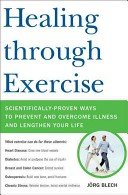 Healing through Exercise: Scientifically-Proven Ways to Prevent and Overcome Illness and Lengthen Your Life, by Jörg Blech (Da Capo Press, 2009) Originally published as Heilen mit Bewergung (S. Fischer Verlag, 2009)
Healing through Exercise: Scientifically-Proven Ways to Prevent and Overcome Illness and Lengthen Your Life, by Jörg Blech (Da Capo Press, 2009) Originally published as Heilen mit Bewergung (S. Fischer Verlag, 2009)
We all know exercise is good for us, right? So who needs yet another book telling us so?
Knowing what we should be doing is one thing, but actually doing it is another, and Healing through Exercise provides motivation in spades.
Beware the cure that is marketed as a panacea, we are told: if it claims to fix all ills, it’s probably a fraud. That’s sound advice, but Jörg Blech makes a convincing case that simple, regular exercise is as close to a cure-all as we’ll ever find. Whether the issue is heart disease, diabetes, osteoporosis, cholesterol, hypertension, Alzheimer’s disease, back pain, cancer, impotence, ADHD, depression, brain development, immune system health, stress overload, or “old age,” moderate, regular exercise is essential—and in some cases even sufficient—for preventing illness and restoring health. We’re more familiar with the preventative side, but Blech cites study after study showing how exercise can even reverse existing damage. It’s never too late to take advantage of the benefits of exercise. (Note to self: this should be incentive to get started at any age, but never an excuse for procrastination.) (More)
I am thankful for the baby formula that is available today.
I know. Me, the Notorious Despiser of Artificial Baby Feeding, thankful for infant formula. But it’s true. (More)
Permalink | Read 2900 times | Comments (0)
Category Health: [first] [previous] [next] [newest] Children & Family Issues: [first] [previous] [next] [newest] Food: [first] [previous] [next] [newest] The Good New Days: [first] [previous] [next] [newest]
Continuing with the Thanksgiving/Good New Days series, today (and every day) I am thankful for smoke-free restaurants, homes, airplanes, offices, grocery stores, and even bowling alleys! This is a societal sea-change that is most definitely for the better.
You youngsters simply cannot imagine what it was like. (More)
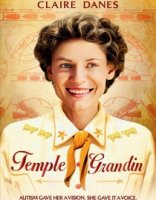 Temple Grandin (HBO, NR)
Temple Grandin (HBO, NR)
Why are you reading this post when you could be rushing to your nearest video store (is that phrase as passé as "dialing a phone number"?) and grabbing a copy of Temple Grandin? It would be trite to say that this is one of the most amazing and inspiring movies I have ever seen, though it is. It would be understatement to say that Temple Grandin is an incredibly amazing and inspiring person.
"Highly functioning autistic" doesn't begin to describe this brilliant visual thinker—and university professor—whose humane designs have revolutionized livestock handling. My introduction to Temple Grandin was through her TED lecture, The World Needs All Kinds of Minds. That's a good place to start, but don't miss the movie. (As far as I can recall it is completely grandchild safe.) (More)
"Harm reduction," a new term to me, though not a new concept, is a controversial approach to social problems, in which illegal, immoral, or otherwise harmful behaviors are attacked, not at the root, but at the branches: distributing condoms to slow the spread of AIDS, needle exchange programs for drug addicts, and legalized prostitution, for example. It is palliative care: attempting to ameliorate the symptoms of an apparently incurable social disorder.
Whether you approve of the idea or think it only exacerbates the problem—like Needle Park in Zurich, one of Switzerland's early experiments, which succeeded in reducing AIDS infections and drug-related deaths, but attracted addicts and professional drug dealers from all over Europe—the following story is heartwarming. It brings to mind Mother Teresa, who, if she couldn't cure the ills of the lowest and the poorest in Calcutta, at least gave them the touch of a loving hand, and a clean, safe, comfortable place in which to die. (More)
I wrote about xylitol when I discovered it in Japan four years ago, and that remains one of my most popular posts. Although I did not experiment further with xylitol as a sugar substitute, I continued to use it as a dental rinse, swishing a small spoonful around in my mouth after brushing my teeth at night.
Until I started worrying about the fact that the xylitol I had was made in China, that is. Chinese manufacturers were caught substituting poisonous substances for more expensive, safe ingredients in toothpaste and children's toys, as I wrote about in 2007, and later in baby formula, candy, and other products containing milk. I wrote to the manufacturer of my xylitol, seeking reassurance, but received no answer. (More)
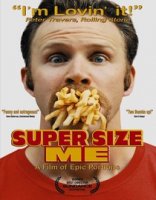 Super Size Me (Sony, 2004, PG-13)
Super Size Me (Sony, 2004, PG-13)
When Morgan Spurlock was growing up, his mother made the family's meals at home; they ate at restaurants only on very rare, special occasions. Once a common scenario, it is no longer true for Fast Food America.
Spurlock, young, healthy, and in fine physical condition, turned himself into a human guinea pig to investigate the health effects of fast food: For 30 days, he ate at McDonalds, and only McDonalds, three meals a day, every day. His progress (regress) was evaluated and monitored by three doctors, who expected to see no more problems from his change of diet than a moderate rise in his triglyceride levels. Instead, nearly every aspect of his physical and mental health disintegrated rapidly; it took him more than a year to recover from his month-long binge.
Super Size Me is a dramatic condemnation of the fast food industry, and even more so of modern America's eating habits. However, it would have been more effective, if less dramatic, had Spurlock have eaten reasonably instead of deliberately (and sickeningly) gorging himself at every meal. He conflates problems of food quality and food quantity, muddying the results.
The movie is somewhat interesting, but I'd rate it worse than PG-13 for sexual content and language. Unlike some reviewers, I don't find the graphic bariatric surgery to be a problem, but I wouldn't watch it while eating.
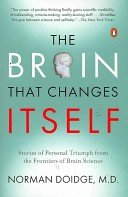 The Brain that Changes Itself: Stories of Personal Triumph from the Frontiers of Brain Science by Norman Doidge (Penguin, New York, 2007)
The Brain that Changes Itself: Stories of Personal Triumph from the Frontiers of Brain Science by Norman Doidge (Penguin, New York, 2007)
Neuroplasticity.
The idea that our brains are fixed, hard-wired machines was (and in many cases still is) so deeply entrenched in the scientific establishment that evidence to the contrary was not only suppressed, but often not even seen because the minds of even respectable scientists could not absorb what they were certain was impossible. Having been familiar since the 1960s with the work of Glenn Doman and the Institutes for the Achievement of Human Potential, the idea that the human brain is continually changing itself and can recover from injury in astonishing ways did not surprise me. In fact, the only shock was that in a 400 page book on neuroplasticity and the persecution of its early pioneers I found not one mention of Doman's name. But the stories are none the less astonishing for that.
In Chapter 1 we meet woman whose vestibular system was destroyed by antibiotic side-effects. She is freed by a sensor held on her tongue and a computerized helmet from the severely disabling feeling that she is falling all the time, even when lying flat. That's the stuff of science fiction, but what's most astounding is that the effect lingers for a few minutes after she removes the apparatus the first time, and after several sessions she no longer needs the device. (More)
Permalink | Read 8177 times | Comments (6)
Category Reviews: [first] [previous] [next] [newest] Education: [first] [previous] [next] [newest] Health: [first] [previous] [next] [newest] Children & Family Issues: [first] [previous] [next] [newest]
Today's Mallard Fillmore comic inspired this post, which Li'l Writer Guy had actually been working on in the background ever since a conversation we had about the subject last night.

Mind you, I don't know any of the details of how it will work, and am only commenting on the theory that children should be covered on their parents' health insurance until they are 26 years old. (More)
Janet alerted me to Jamie Oliver; DSTB followed up with what is apparently a new show on ABC. It starts next Friday, but the pilot was shown last night; fortunately it's available both at the show site and Hulu, so I was able to watch it. Jamie's attempt to get the people of Huntington, West Virginia to take a healthier approach to eating has the faults of American commercial television (just as does Who Do You Think You Are?), but it's not bad and (so far) is not as over the top as what I've seen of his British shows. If his personality is a little too dramatic for my taste, there's no doubting the sincerity of his preaching and his mission. His gospel is good, fresh food, and in this episode he takes on school lunches.
[Excuse me, school meals. The only meal these children eat at home is dinner. In Oliver's unfeigned horror at the meals served at our public schools, he misses what strikes me as the more important point: Why are all these children eating school food? Why aren't they bringing lunches from home, and why, for Pete's sake, don't they eat breakfast before going to school? If the schools are going to offer food, certainly it should be healthy food, but where are the parents? There's absolutely no need to subject one's children to American public school food, good or bad. The school lunch (and now breakfast) program does serve a useful purpose, making sure children whose parents can't provide meals for them aren't trying to learn on empty stomachs. That's a good thing. But somehow the whole system got skewed; I know that the goal of the school lunch program at our kids' school was to have everyone participate. (We didn't.) I saw not one lunchbox in the show. I hope that while he teaches the adults how easy it is to put together healthy meals, he also teaches the kids how easy it is to make their own healthy lunches. But that's another issue; I know I'm taking on a Great American Icon by dissing the school lunch program.] (More)


